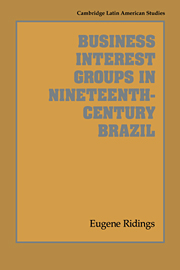Book contents
- Frontmatter
- Contents
- Acknowledgments
- Abbreviations and Usage
- Value of the Mil-reis against the Dollar and the Pound
- Brazil, with cities
- Introduction
- 1 The Genesis of Brazilian Business Interest Groups
- 2 Leadership and Organization
- 3 Influence, Ideology, and Public Relations
- 4 The Export Economy: Agricultural Quality, Markets, and Profits
- 5 The Export Economy: Banking, Credit, and Currency
- 6 The Export Economy: Manpower
- 7 Taxation
- 8 Industrialization
- 9 Communications: Regionalism Perpetuated
- 10 Port Areas and Harbors: Efficiency and Rivalry
- 11 Business Interest Groups and Economic and Urban Integration
- 12 Business interest groups and the Republic
- 13 Conclusion
- Bibliography
- Index
13 - Conclusion
Published online by Cambridge University Press: 27 October 2009
- Frontmatter
- Contents
- Acknowledgments
- Abbreviations and Usage
- Value of the Mil-reis against the Dollar and the Pound
- Brazil, with cities
- Introduction
- 1 The Genesis of Brazilian Business Interest Groups
- 2 Leadership and Organization
- 3 Influence, Ideology, and Public Relations
- 4 The Export Economy: Agricultural Quality, Markets, and Profits
- 5 The Export Economy: Banking, Credit, and Currency
- 6 The Export Economy: Manpower
- 7 Taxation
- 8 Industrialization
- 9 Communications: Regionalism Perpetuated
- 10 Port Areas and Harbors: Efficiency and Rivalry
- 11 Business Interest Groups and Economic and Urban Integration
- 12 Business interest groups and the Republic
- 13 Conclusion
- Bibliography
- Index
Summary
This study has explored and evaluated the ways in which business interest groups affected Brazilian development in the nineteenth century. In doing so it also has examined the business elite that comprised those groups, both as a key to comprehending group policies and for an understanding of the business elite itself. Business interest groups, unlike abstract concepts of class or sector, are concrete organizations created to influence government, and their actions are usually discernible and readily documented. While business interest groups cannot substitute in historical analysis for such abstractions as the “middle class,” their policies can illuminate the true political posture of one of its central elements, the business elite.
Business interest groups, in particular the commercial associations, also provide handy units for study of the background and characteristics of that elite. Fundamental to it was foreignness. Aliens predominated among overseas traders and industrialists and were a sizable minority among factors. That so many businessmen did not become Brazilian when naturalization was easy and convenient indicates that their orientation and sympathies lay abroad. But if foreign predominance serves to explain much of the thrust of commercial association policies, its importance should not be exaggerated. There seems to have been little divergence in opinion between foreign and Brazilian directors or members of the associations on most questions. The interests and necessities of mercantile capitalism appear to have imposed themselves on all. In general, the associations wished to preserve the traditional economy with its strong overseas ties, attached more importance to foreign than to national markets, were more concerned with regional than national prosperity, and had little interest in the nationwide integration of communications.
- Type
- Chapter
- Information
- Business Interest Groups in Nineteenth-Century Brazil , pp. 329 - 338Publisher: Cambridge University PressPrint publication year: 1994



